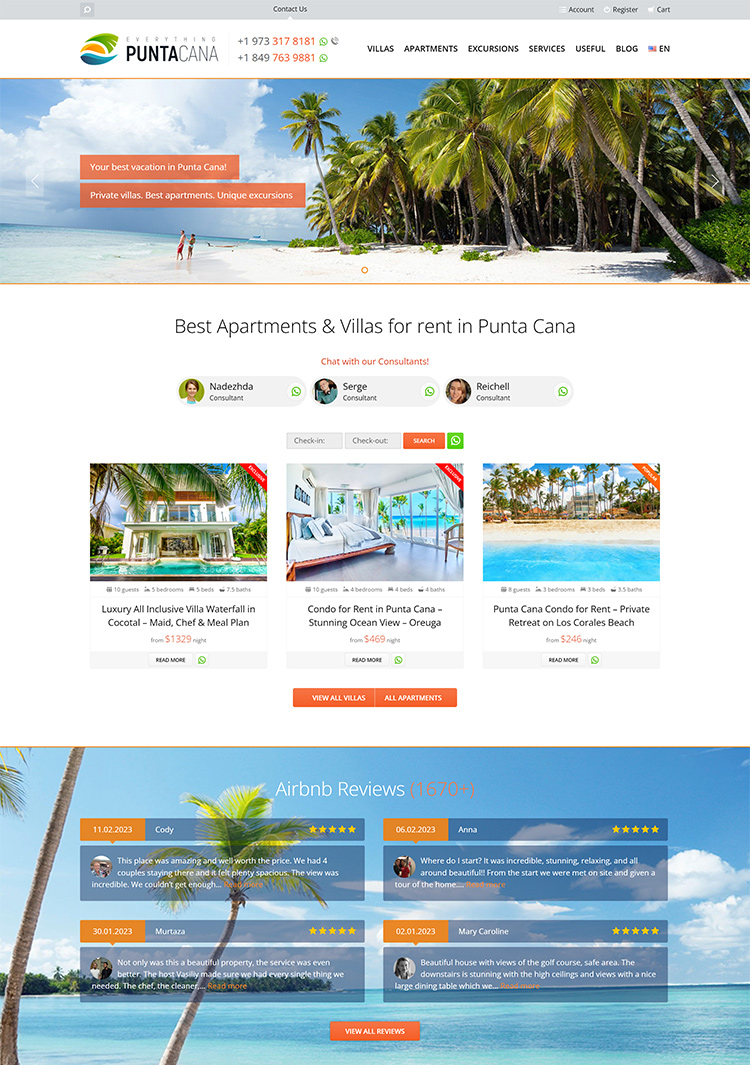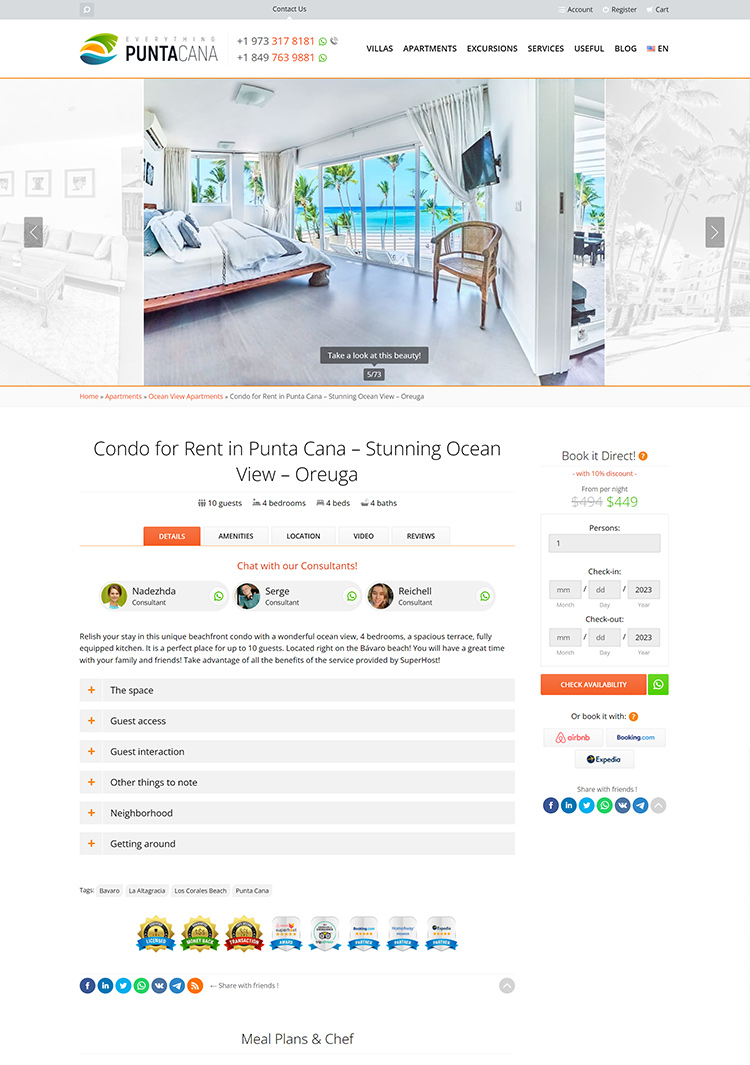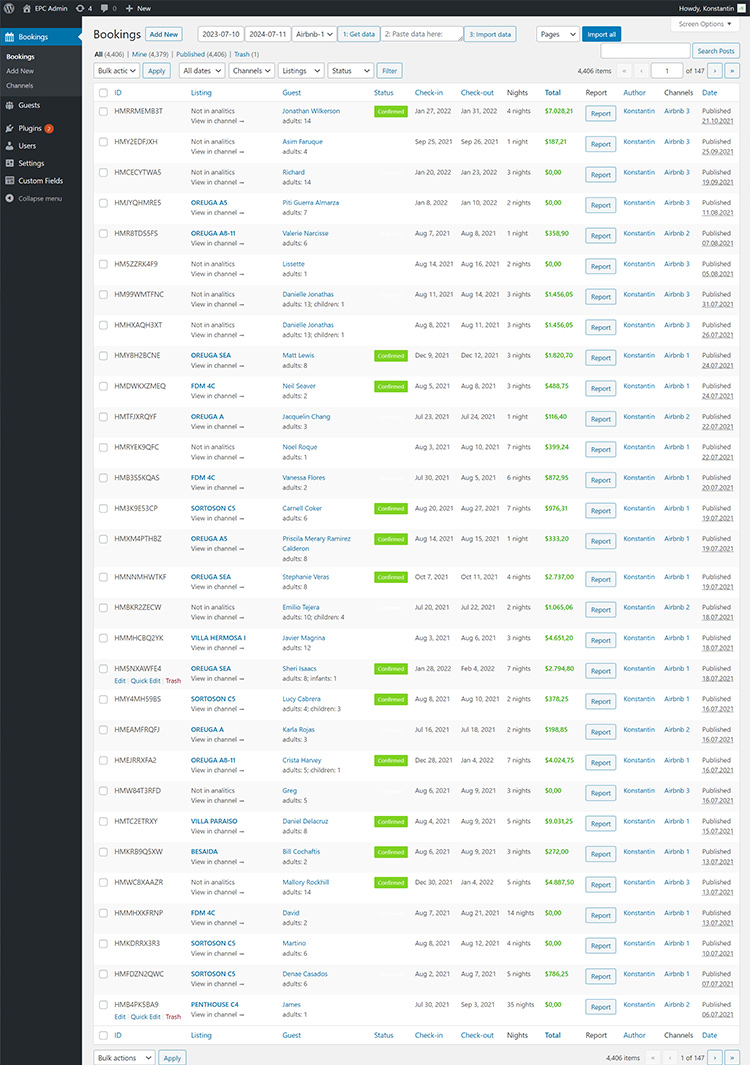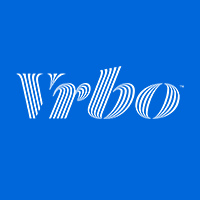Short-Term Rental Direct Booking Website -
Get Your Own Airbnb
You Can Count on Us to Deliver:
Short-Term Rental Site + WooCommerce A WordPress and WooCommerce-powered short-term rental website. Our template is ready to use, mobile-friendly, and designed to show up in search engine results. This increases the likelihood of potential guests discovering your site. ... Show all ↓
Data Transfer From Your Airbnb We'll transfer your data (up to 30 listings), including all descriptions, settings, and images. We know how crucial your current content is and will ensure it flawlessly integrates into your new website. ... Show all ↓
Blog, Forms, Galleries, Sliders etc These features can make your website better and easier to use. They're just a few of the many tools we offer. We'll make sure you have everything you need to create your vacation rental website fast. ... Show all ↓
Data Synchronization With Your Airbnb Our technology keeps your site updated with your Airbnb's latest prices, availability, and details without you having to do anything. Forget about having to manually update your site or double-check for accuracy. ... Show all ↓
Stripe, PayPal, Credit Card Payment Integration Your guests can pick the payment method they prefer, whether it's using their credit card directly or trusted services like Stripe or PayPal. This gives them a safe and easy way to pay, making their experience on your website even better. ... Show all ↓
2 Weeks of Free Website Maintenance Our team will take care of any updates, fixes, or changes required to ensure your website runs smoothly. This frees you up to concentrate on other aspects of your business while we handle website maintenance, providing a stress-free experience for both you and your visitors. ... Show all ↓
From $6,250 /website
We Are Working With the Leaders in OTA
Our 10 years of working with top online travel agencies let us guarantee the quality of our work
Our Short-Term Rental Websites
We can give you access to the admin panel to check that everything is working correctly








How Do We Work
Advantages of Running Your Own
Short-Term Rental Website
Boosting Your Rental Income Take bookings directly from customers, avoiding the fees charged by external booking services. This gives you more control over bookings and can greatly boost your earnings.
Personalize Guest Experience Your website allows you to build a distinctive and memorable visit for guests by giving you the power to manage its layout, content, and communication.
Increase Conversion Rates A vacation rental website is a great way to present your property. It uses detailed descriptions, beautiful pictures, full information, and reviews from guests to build trust and increase reservations.
Direct Guests Communication You can talk directly to guests, offer tailored customer service, answer questions, and manage bookings well. This approach helps strengthen relationships with guests and makes them more likely to book again.
Frequently Asked Questions
How quickly do you create a vacation rental website?
It usually takes around six weeks.
What kind of payment tools do you use with customers?
We use various payment methods such as PayPal, Stripe, Zelle, direct bank transfers, and different cash apps for transactions.
Can I list my Airbnb on Booking.com?
Yes, you can list your Airbnb property on Booking.com. It’s a good way to reach more guests and increase your bookings. Just make sure to keep your calendars updated across platforms to prevent double bookings. We can help keep your listings in sync.
What is a vacation rental website used for?
A vacation rental website helps you find and book places to stay for short periods, like a few nights or weeks.
It connects travelers with hosts who are renting out their spaces. You can search based on location, check out pictures and details, talk to the host, and book and pay online. It’s a great hotel alternative.
Is it worth having a vacation rental website?
Yes, it’s worth it. Your own website gives you more control, helps you establish your brand, and allows direct interaction with guests. It’s an effective way to differentiate yourself and increase your bookings.
What is the best platform to make a booking website?
The best platform depends on your needs. WordPress, Wix, Squarespace, Shopify, and Joomla are popular choices.
Consider how easy they are to use, how much you can customize them, and their integration with booking systems.
Should I make a website for my rental property?
Definitely. A website for your rental property has many advantages. It lets you control your property’s presentation, helps you build a brand, and offers a direct booking option that can save you commission fees. Plus, it improves your online visibility and can attract more renters.
What is the short term rental website used for?
A short-term rental website is used for finding and booking temporary accommodations for brief periods, typically ranging from a few nights to several weeks.
The website provides details, photos, and reviews of the properties, allowing guests to make informed decisions.
Additionally, these platforms often offer a secure way to communicate with hosts, book accommodations, and process payments directly through the site.
What do I need to create a vacation rental website?
To create a vacation rental website, it’s essential to have a well-defined brand and a clear outline of the services provided. Additionally, ensure you have professional photos of your property, attractive and detailed descriptions, and a straightforward booking system.
Invest in a website design that is both attractive and easy to navigate. Also, ensure you implement secure payment methods for your guests’ convenience.
Lastly, developing a marketing strategy is crucial for promoting your website. This could involve utilizing SEO techniques and engaging in social media marketing.
Is it worth having a website for your AirBnB property?
Having a website for your Airbnb property gives you more control over your branding and the presentation of your property.
Though Airbnb is a strong platform, your own website enables you to market your property in a more personal and direct way to prospective guests.
Additionally, by accepting bookings directly, you can bypass some of the fees that come with using Airbnb
What does the cost of developing a vacation rental website include?
- Web hosting services, which ensure your website is available online.
- The cost to design and develop your website depends on whether you choose a ready-made template or a custom design.
- If you’re taking bookings on your website, you need e-commerce integration for secure transactions.
- An SSL Certificate is required to keep data exchanges safe.
- You’ll also need to work on SEO and marketing, add any necessary software, and create content.
- Regular testing, along with ongoing support and maintenance, are important to keep your website current. This includes renewing your website’s domain and hosting, updating your content and SEO tactics, and making sure your site is secure.
What is the difference between an Airbnb and a vacation rental?
Airbnb is a website where people can list their properties for others to rent for short periods. It works like similar sites such as Vrbo, Booking.com, and TripAdvisor, linking travelers with various types of places to stay all over the world.
On the other hand, a vacation rental website is usually managed directly by the owner or the manager of the property. This means they take care of all the bookings and customer service themselves, without using a middleman service like Airbnb.
Optimizing Vacation Rental Website
Website Development and Platform Integration
How can I ensure my website is user-friendly and competitive with Airbnb?
To ensure your website is user-friendly and competitive with Airbnb, focus on creating an intuitive and engaging user interface (UI) and user experience (UX). This includes a simple and clear navigation structure, fast loading times, mobile optimization, high-quality images, and detailed property descriptions.
Implement features such as user reviews, secure payment options, and responsive customer service. Additionally, offering unique functionalities like virtual tours or personalized recommendations can differentiate your platform. Keeping your website updated with the latest UX/UI trends and gathering user feedback for continuous improvement are also key strategies.
What are the latest web development technologies suitable for a vacation rental platform?
The latest web development technologies suitable for a vacation rental platform include React or Vue.js for dynamic and responsive front-end development, Node.js for scalable server-side applications, and MongoDB or PostgreSQL for efficient data storage. Leveraging cloud services like AWS or Google Cloud can enhance your platform’s scalability and reliability.
Additionally, incorporating API integrations for payment processing (Stripe, PayPal), maps (Google Maps API), and calendar synchronization (iCal, Google Calendar API) can significantly enhance functionality. Adopting these modern technologies can help create a robust, scalable, and feature-rich platform.
How to implement advanced search and filtering options for properties on my vacation rental website?
Implementing advanced search and filtering options requires a thoughtful approach to database design and user interface planning. Start by identifying the key criteria guests use to search for properties, such as location, price range, number of bedrooms, and special amenities. Use Elasticsearch or similar technologies for fast and efficient search capabilities.
Develop a user-friendly interface with clear and accessible filters, allowing users to easily refine their search results. Ensuring that search results load quickly and are displayed in an easy-to-compare format will enhance the user experience. Regularly testing and updating based on user feedback can further refine these features.
For vacation rental website owners aiming to stand out in a competitive market, investing in a user-friendly design, adopting the latest web technologies, and implementing advanced search and filtering options are crucial steps. These strategies not only enhance the user experience but also improve operational efficiency, making your platform a strong competitor to established players like Airbnb. Embracing innovation and continuously seeking feedback for improvement will keep your platform relevant and appealing to users.
Calendar Syncing and Data Management
What are the best practices for real-time calendar syncing across multiple vacation rental platforms?
Best practices for real-time calendar syncing across multiple vacation rental platforms include using centralized channel management software that supports direct API connections to platforms like Airbnb and VRBO.
This ensures immediate updates to your calendar across all platforms when a booking is made, minimizing the risk of double bookings. Regularly review and clean your calendar data to prevent syncing errors. Additionally, setting up automatic notifications for new bookings can help keep track of updates and manage your property efficiently.
How can I automate pricing updates across my website and synced platforms like Airbnb and VRBO?
To automate pricing updates across your website and platforms like Airbnb and VRBO, utilize dynamic pricing tools that adjust your rates based on demand, seasonality, and local events. These tools can integrate with channel managers, allowing automatic updates across all your listings.
Ensure the dynamic pricing software you choose offers direct API integration with your platforms for seamless synchronization. Regularly monitor performance and adjust your pricing strategy accordingly to optimize revenue.
How to ensure data privacy and security when syncing information with Airbnb?
Ensuring data privacy and security when syncing information with Airbnb involves implementing robust cybersecurity measures. Use secure, encrypted connections (SSL/TLS) for data transmission and ensure your channel management software adheres to industry-standard security protocols.
Regularly update your software to patch any vulnerabilities. Additionally, comply with data protection regulations such as GDPR by obtaining consent from users before collecting or sharing their data and providing clear privacy policies. Regularly audit your data handling practices to ensure they meet security standards.
Adopting best practices for calendar syncing, automating pricing updates, and ensuring data privacy and security are critical components of managing a successful vacation rental business in today’s digital age.
Leveraging technology to streamline operations, while prioritizing user trust and compliance, not only enhances operational efficiency but also builds a strong foundation for growth. Staying informed and agile in adapting to new technologies and regulations will help vacation rental owners thrive in a competitive market.
Strategy and Considerations for Vacation Rental Owners
What marketing strategies can I employ to increase my vacation rental’s visibility alongside listing on Airbnb?
To increase your vacation rental’s visibility alongside listing on Airbnb, employ a multifaceted marketing strategy. Utilize social media platforms to showcase your property and engage with potential guests through compelling content and targeted ads. Create a Google My Business listing to improve local search visibility.
Leverage email marketing to send updates, offers, and personalized recommendations to past and potential guests. Encourage reviews and word-of-mouth referrals by offering exceptional guest experiences. Collaborating with local businesses and tourism boards can also drive traffic to your listing.
How to optimize my vacation rental website for SEO to compete with Airbnb?
Optimizing your vacation rental website for SEO involves several key strategies. Ensure your website is mobile-friendly and has fast loading times, as these factors significantly impact search rankings.
Use keyword research to identify terms potential guests are searching for and incorporate these keywords naturally into your website’s content, titles, and meta descriptions.
Create high-quality, relevant content, such as blog posts about local attractions or travel tips, to attract backlinks and improve your site’s authority. Utilize local SEO tactics by including your property’s location in your keywords and creating listings in local directories.
What are the legal considerations and insurance requirements for running a vacation rental?
Legal considerations and insurance requirements for running a vacation rental vary by location but generally include obtaining the necessary licenses and permits to operate a short-term rental. Comply with local zoning laws, health and safety regulations, and tax obligations.
It’s crucial to have comprehensive insurance coverage tailored to vacation rentals, protecting against property damage, liability claims, and loss of income. Regularly reviewing and updating your legal documents, such as rental agreements and house rules, is essential to ensure they align with current laws and regulations.
Developing a robust marketing strategy, optimizing your website for SEO, and understanding the legal and insurance landscape are crucial steps for vacation rental owners to increase visibility, compete effectively, and operate securely in the rental market.
By focusing on these strategic considerations, owners can enhance their property’s appeal, reach a wider audience, and navigate the complexities of the vacation rental industry with confidence.
Revenue and Listing Management
How to use dynamic pricing tools to maximize income from my vacation rental?
To maximize income from your vacation rental, leverage dynamic pricing tools that adjust your rates based on market demand, seasonality, special events, and competition. These tools analyze vast amounts of data to recommend optimal pricing strategies.
Integrate a dynamic pricing tool with your property management system or channel manager to automatically update your listing prices across all platforms, including your website, Airbnb, and VRBO. Monitor your performance metrics regularly to adjust your pricing strategy as needed, ensuring you remain competitive while maximizing revenue.
What analytics and reporting tools should I integrate into my vacation rental website to track performance?
Integrating analytics and reporting tools into your vacation rental website is essential for tracking performance and making informed decisions. Google Analytics is a powerful and free tool that provides insights into your website’s traffic, user behavior, and conversion rates.
For financial performance and operational metrics, consider specialized vacation rental software that offers dashboards for bookings, revenue, occupancy rates, and average daily rates. These tools can help you identify trends, optimize your marketing and pricing strategies, and improve the overall guest experience.
How can I manage guest reviews and feedback across my website and platforms like Airbnb and VRBO?
Managing guest reviews and feedback effectively requires a proactive and organized approach. Utilize a centralized platform or property management system that aggregates reviews from multiple sites, including your website, Airbnb, and VRBO, allowing you to monitor and respond to feedback efficiently.
Prioritize timely and personalized responses to both positive and negative reviews to demonstrate your commitment to guest satisfaction. Encourage satisfied guests to leave reviews by sending follow-up emails or messages after their stay, and consider offering incentives for feedback. Implementing a process for addressing and learning from feedback can lead to improvements in your service and guest experience.
Implementing dynamic pricing strategies, integrating analytics and reporting tools, and effectively managing guest reviews are key components of successful revenue and listing management for vacation rentals. These strategies enable owners to optimize pricing, understand performance metrics, and enhance guest satisfaction, leading to increased competitiveness and revenue in the vacation rental market.
User Experience and Engagement
How can I offer a unique booking experience on my website to stand out from Airbnb?
To offer a unique booking experience that stands out from Airbnb, focus on personalization and ease of use. Implement a streamlined booking process with minimal steps and flexible payment options. Offer personalized recommendations based on guest preferences or previous stays, such as local attractions or customized packages.
Enhance your website with storytelling elements about the property and the surrounding area, providing a more immersive experience. Providing exceptional customer service, such as a live chat feature for instant assistance, can also differentiate your booking experience.
What features can I add to my website to enhance guest engagement and retention?
Enhancing guest engagement and retention can be achieved by adding interactive and personalized features to your website. Consider implementing a loyalty program that rewards guests for repeat bookings or referrals. Create a blog or resource section with valuable content about local experiences, events, and tips for guests.
Offer a user account area where guests can manage their bookings, wish lists, and receive personalized offers. Interactive elements like quizzes to find the perfect property or feedback surveys to improve services can also boost engagement.
How to integrate virtual tours and high-quality photos into my vacation rental listings?
Integrating virtual tours and high-quality photos into your vacation rental listings involves a few key steps. First, hire a professional photographer or a virtual tour provider who specializes in real estate or vacation rentals to capture your property in its best light. Once you have your virtual tours and photos, ensure your website’s content management system (CMS) supports media-rich listings.
Use responsive design techniques so that these visual elements display beautifully across all devices. Embedding virtual tours and showcasing high-quality photos prominently on your listing pages can significantly enhance the visual appeal and help guests feel more confident in their booking decisions.
Offering a unique booking experience, enhancing guest engagement and retention, and integrating virtual tours and high-quality photos are crucial strategies for creating a compelling online presence for your vacation rental.
These elements not only differentiate your property from competitors like Airbnb but also play a significant role in attracting and retaining guests, ultimately contributing to the success and sustainability of your vacation rental business.
Operational Efficiency and Support
What automation tools are available for managing bookings, cleaning schedules, and guest communication?
Automation tools that enhance operational efficiency in managing bookings, cleaning schedules, and guest communication include property management systems (PMS) like Guesty or Tokeet, and channel managers such as Hostfully or Lodgify.
These platforms automate the synchronization of bookings across multiple channels, schedule cleaning services based on check-out dates, and trigger communication workflows for guest check-in instructions or feedback requests.
Integrating smart locks or keyless entry systems can also automate access control, enhancing both efficiency and guest convenience.
How to provide 24/7 customer support for guests booking through my vacation rental website?
Providing 24/7 customer support for guests can be achieved by implementing a combination of live chat support, AI-powered chatbots, and an FAQ section on your website. Chatbots can handle common inquiries and booking processes around the clock, while live chat ensures that more complex questions are addressed by human agents.
Additionally, offering support through multiple channels, such as email, phone, and messaging apps, ensures guests can reach you through their preferred method. Outsourcing to a professional customer service provider specializing in the hospitality industry can also be an option for round-the-clock support.
What are the challenges of managing a vacation rental website and how can I overcome them?
Managing a vacation rental website presents challenges such as staying competitive, handling operational tasks efficiently, and ensuring a high-quality guest experience. To overcome these challenges, focus on differentiating your offering through unique property features or experiences. Leverage automation tools for efficient operations and use analytics to understand guest behavior and preferences.
Prioritize guest satisfaction by soliciting and acting on feedback. Staying informed about industry trends and continuously optimizing your website and services based on data and guest input can help navigate these challenges successfully.
Embracing automation tools for operational tasks, providing round-the-clock customer support, and addressing the challenges of vacation rental management are essential strategies for maintaining operational efficiency and delivering a superior guest experience.
These efforts not only streamline your operations but also position your vacation rental as a competitive and appealing choice for travelers, ensuring the longevity and success of your business.
Show all ↓
Top Benefits of Short-Term Rental
Websites in 2025
Increased Revenue
Dynamic rate management tools help optimize your nightly rates based on demand, season, and other factors, maximizing your income potential from your rental property.
Enhanced Guest Communication
Automated systems for efficient guest communication, including welcome messages and reminders, maintain a personal touch while streamlining operations.
Informed Decision Making
Access to detailed reports and analysis on occupancy and revenue helps you understand your property's performance and make informed business decisions.
High-Quality Visuals
Leverage professional photos and videos to showcase your property in the best light, attracting more guests and highlighting your rental’s unique features.
High Market Demand
The increasing demand for short-term rentals, driven by modern travel preferences, ensures a steady flow of guests and profitability.
Flexible Offerings
Short-term rental websites offer the flexibility to rent out any space, providing the option to adapt offerings based on personal or market needs.
Secure Transactions
Advanced security measures and data protection for both host and guest information, ensuring a trustworthy platform for rental management.
Customization and Personalization
Customizable software options cater to your specific business needs, enhancing your rental management experience.
Diverse Renter Pool
Short-term rentals attract a diverse range of tenants, maximizing occupancy rates and income through quick turnover and varied guest experiences.
Marketing and Promotion Tools
Access to built-in marketing tools helps you reach a wider audience through promotional campaigns, increasing visibility and bookings.
Recognition and Rewards
Benefit from reward programs such as Superhost status, enhancing your listing's reputation and attracting more guests through proven excellence.
Localized Experience
Provide guests with a personalized experience by offering insights into local attractions, dining, and culture, enhancing their stay and satisfaction.
Show all ↓
Order Short-Term Rental Website
Feel free to contact us! We are always happy to hear from you!












